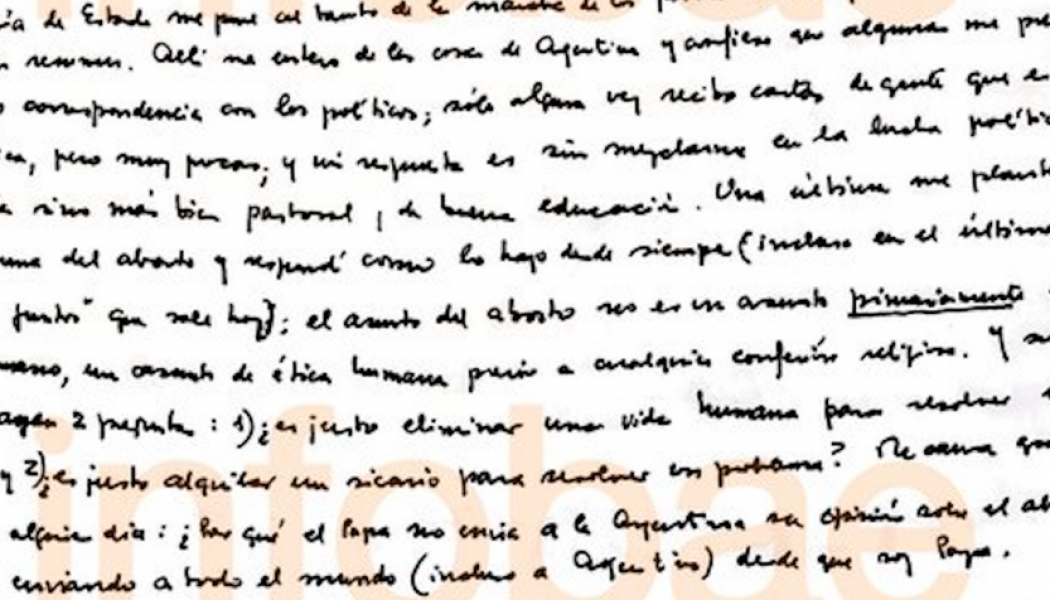
> Italiano
> English
> Español
> Français
> All the articles of Settimo Cielo in English
*
“Aware that hearing a pope return to this topic will annoy many….”
It is with this caveat that Pope Francis introduces the tough words he dedicates to abortion in his latest book “Let Us Dream,” which on December 1 hit store shelves all over the world.
And that’s the way it is. Whenever he touches on this subject, Francis by no means enjoys good press. On the contrary, he is systematically ignored.
And yet just recently the pope has spoken out not once but several times against abortion, prompted by his Argentina, where the current president, the Peronist Alberto Fernandez, aims to pass a law that would liberalize the killing of the unborn child. The law was approved by the chamber of deputies on December 11 with 131 votes in favor, 117 against, and 6 abstentions. But it is in the senate that the decisive vote will take place, as before in 2018, when the senators rejected a similar abortion law also approved by the chamber of deputies with 129 votes in favor, 125 against, and one abstention.
*
Francis delivered the first blow in the handwritten letter he addressed on November 22 to a group of women from the slums of Buenos Aires who have been fighting against the legalization of abortion since 2018.
Settimo Cielo reproduced this letter in its entirety, with its bluntest passage presenting these two questions: “Is it right to eliminate a human life in order to solve a problem? And is it right to hire a hitman in order to solve a problem?”
*
Words of such unprecedented severity from Jorge Mario Bergoglio are certainly not just a slip, given that he repeats them verbatim in his book “Let Us Dream,” as part of the following argument:
“I cannot keep silent about the more than 30-40 million unborn lives that are discarded each year through abortion, according to data from the World Health Organization. It is painful to note that in many regions considered developed this practice is often promoted because the children on the way are disabled or unplanned. But human life is never a burden. It needs to be accommodated, not discarded.
“Abortion is a grave injustice. It can never be a legitimate expression of autonomy and power. If our autonomy requires the death of others, then that autonomy of ours is nothing more than an iron cage. I often ask myself two questions: Is it right to eliminate a human life in order to solve a problem? And is it right to hire a hitman in order to solve a problem?
“My predecessor Saint Paul VI warned in his 1968 encyclical letter ‘Humanae vitae’ about the temptation to consider human life as one object among many over which powerful and educated people can exercise dominion. How prophetic is his message now! These days prenatal diagnosis is commonly used to filter out those who are deemed weak or inferior.”
*
But it doesn’t end there. On December 1, in a videoconferencing appearance in the Argentine chamber of deputies during the discussion on the abortion law, the priest José María “Pepe” Di Paola, a pastor from the outskirts of Buenos Aires and a longtime friend of Bergoglio, reported that he had received a letter from Rome in which the pope writes to him:
“For me the deformity in understanding abortion is born mainly from considering it a religious question. The question of abortion is not essentially religious. It is a human problem rather than a religious option. The question of abortion must be addressed scientifically.”
Fr. Pepe added that the word “scientifically” had been underlined by the pope.
*
There’s more. In another handwritten letter of December 1 to a group of Argentine former pupils, Francis repeats once again those two blunt questions of his, which in the original Spanish (see photo) go like this:
“1) ¿Es justo eliminar una vida humana para resolver un problema? Y 2) ¿Es justo alquilar un sicario para resolver un problema?”.
The pope adds that if he has again posed these questions in just the same way in his book “Let Us Dream,” it is precisely because he wants them to reach not only Argentina but “the whole world.”
The full text of the letter is reproduced below. Because it is also interesting for how Bergoglio frames his invective against abortion.
In fact, the pope wants to make it clear that what is important to him is to go to the substance of things and speak directly to the world, without interfering in the political struggle, least of all with Argentine politics.
In particular, Bergoglio takes pains to highlight his twofold distancing: from former Peronist president Cristina Fernandez de Kirchner, with whom he says he “has had no contact” since she left office, and from Juan Grabois, leading organizer of the “popular movements” otherwise so dear to the pope, whom he appointed as consultant to the Vatican dicastery for promoting integral human development.
And the reason – he writes – for this distancing is that both of them pretend to be much closer to and friendlier with the pope than they really are. With the result that the media end up attributing to me, Francis, not “what I say,” but what others “say that I say.”
In a postscript to the letter the pope refers, as far as his judgment on the media is concerned, to nos. 42-53 of the encyclical “Brothers all,” where the subtitles are certainly not benevolent: “The illusion of communication”; “Shameless aggression”; “Information without wisdom”; “Forms of subjection and self-contempt.”
Perhaps with a thought about how the media treat him, Francis, now exalting him, now censuring him, depending on what he says. Even “L’Osservatore Romano” has completely ignored the pope’s handwritten letters cited on this page, with their anti-abortion wallops.
*
To all this it must be added that the bishops of Argentina – evidently trained by their compatriot pope – have also taken to the field against the law on abortion with much more vigor than in the past, among other things by encouraging participation in an impressive march in defense of life held on November 28 in front of the congress building.
And this just as in Europe, in an ever less Catholic Poland, the churches are under siege and the bishops are being made the laughingstock of a mass protest – blatantly supported by a November 26 resolution of the European parliament – against the Polish supreme court’s injunction on the legalization of eugenic abortion.
————
THE LETTER OF POPE FRANCIS TO HIS ARGENTINE FORMER PUPILS
1.12.2020
Dear friends,
1.12.2020
Dear friends,
Thank you for the message. I was very happy to receive it and it also makes me happy that you are so concerned about the good of the homeland. Love of homeland is a fundamental value, it indicates love for the fathers of the homeland, love for the traditions, love for the people of the homeland. Sometimes I think (looking at some countries of Europe) that more than love for homeland what is apparent is love for the “company” that runs the country … and when you see this I am reminded of Jorge Dragone’s poem: “our homeland has died.”
I have to confess to you that I am not aware of everything that is happening there, in detail. The secretariat of state updates me on international affairs once a week. They do it well and with meetings. There I find out about things in Argentina, and I confess that some of them worry me. I have no correspondence with politicians; only occasionally do I receive letters from people in politics, but very few; and my answer does not involve me in the everyday political struggle but is instead pastoral and educational. One of the most recent ones posed the problem of abortion, and I responded as I have always done (including in my latest book “Let Us Dream,” which comes out today); the issue of abortion is not primarily religious, but human, a matter of human ethics prior to any religious confession. And I suggest asking two questions: 1)Is it right to eliminate a human life in order to solve a problem? And 2) Is it right to hire a hitman in order to solve a problem? I am amused when someone says, “Why doesn’t the pope let Argentina know about his opinion on abortion?” Because I do nothing other than let the whole world (including Argentina) know about it now that I am pope.
And this touches on another problem. In general, what is known there is not what I say, but what they say that I say, and this on account of the media that, as we know very well, conduct themselves on the basis of partial, particular, or partisan interests. In this I believe that Catholics, from the episcopate to the faithful of a parish, have the right to know what the pope really says … and not what the media have him say; here the phenomenon of retelling plays a large role (e.g. that guy told me the other guy said this… and so the chain continues). With this method of communication, in which each one adds or takes something away, implausible results are achieved, like the story of Little Red Riding Hood ending up at a table where she and her grandmother eat a delicious stew made of wolf meat. So it goes with “retelling.”
Twice they mention my relationship (closeness, friendship) with Mrs. de Kirchner. The last time I had contact with the two former presidents (she and Mr. Macri) was when they were in office. After that I had no contact with them. It is true that the expression “I am a good friend of” or “I am in regular contact with” is very much how the game is played in Buenos Aires, and this is not the first time I am sorry to tell you so (jokingly I would tell you I never had “so many friends” as I do now).
Regarding “private property” I do nothing but repeat the social doctrine of the Church. It is true that some take up these remarks to reform or interpret them according to their point of view. Saint Paul VI and Saint John Paul II, in this regard, have some even tougher expressions. I believe that in the parishes and in the Catholic schools the social doctrine of the Church is not sufficiently explained, especially the trajectory from Leo XIII up to now; this is why there is so much confusion. A holy bishop, whose cause for canonization has been introduced, said: “When I take care of the poor they say that I am a saint; but when I ask about the cause of so much poverty they call me a communist.”
Dr. Grabois, for years, has been a member of the dicastery for integral human development. Regarding what he allegedly says (that he is my friend, that he is in contact with me, etc.) I ask you a favor; for me it is an important one. I need copies of the statements in which he says this. Receiving them will be a great help to me.
Well, this letter has got to running long. I pondered several times over the signatures … and remembered them one by one. Is any of you a great-grandfather yet? And I went back to the years ’64-65 and with great of affection caressed images that “touched” the heart while, almost unconsciously, the phrasing of Gerardo Diego’s toast held sway. For me this too is going back to the sources.
Thank you for writing. I pray for you and your families; I ask you to please continue doing so for me.
May Jesus bless you and the Holy Virgin protect you. Fraternally,
Francisco
PS: There is more on what I say concerning the media in Fratelli tutti nos. 42-53.
.
Join Our Telegram Group : Salvation & Prosperity








